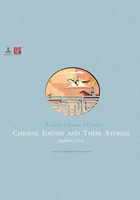
覆水难收 (fù shuǐ nán shōu)
Spilt Water Lost
It is a pity that, more often than not, a wrong step cannot be retaken or changed for the better. In such cases, English speakers are likely to recall the saying, “It’s no use crying over spilt milk,” while most Chinese will cite the idiom Fu Shui Nan Shou, or “spilt water cannot be retrieved.”
Unlike other Chinese idioms, this popular four-character phrase has three different stories explaining its origin.
Of the three, the most widely accepted is about a divorce case involving one of the most famous strategists in Chinese history who achieved success very late in his career.
Jiang Taigong, who lived during the late 11th century BC, married a woman named Ma when he was a poor young scholar.
Jiang cared little about material things and devoted almost all his time and energy to studying history and military strategies and tactics.
After living in abject poverty with Jiang for several years, Ma got fed up with this “bookworm,” who in her belief was not likely ever to become rich or famous. So she divorced him and left.
Jiang’s brilliant talents were not discovered until he met King Wen of the Western Zhou Dynasty (11th century-771 BC). By that time, Jiang was already a septuagenarian.
Despite his advanced age, Jiang helped the king and his successor, King Wu, unite the kingdom and overthrow the Shang Dynasty (16th century-11th century BC).
As a reward for his meritorious service, Jiang was first appointed prime minister and later made the Duke of Qi.
After learning about Jiang’s success, his exwife, who was also old then, came to see him and pleaded for a reunion.
In response, Jiang took a basin of water and throw it on the ground and told his ex-wife: “Only if you can gather up the spilt water will I agree to remarry you.”

But all that the weeping and rueful old woman could gather up was mud.
Gnawed by deep regret and sorrow, Ma left Jiang and never returned.
A lesson that one can learn from the story, or the Chinese idiom, is that in order to avoid the predicament of “crying over spilt milk” or “retrieving spilt water,” one should either look before leaping or never look back at all.